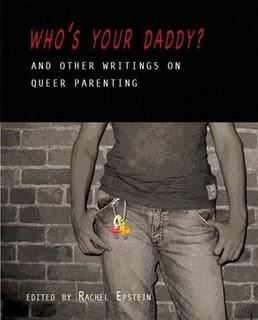Who's Your Daddy?

Postmodern indeed. As a single Black lesbian mother, I assumed that a resource like this wouldn’t yet exist. On searching, I discovered a literary road map to queer parenting and family that is current, diverse and mini-encyclopedic in its breadth. Reading this work made me feel as though I had added to my family of choice. Who’s Your Daddy? documents the adventures and challenges of queer parents, including the parenting experiences of single, partnered, co-parenting and polyamorous parents. Essays from more than thirty contributors detail recent aspects of queer parenting history, including legal victories and challenges in the United States and Canada, the experiences of queer spawn (look it up) as well as the personal parenting experiences of single and partnered individuals including transgender women and men, lesbian, gay, bisexual and queer mothers, parents, and fathers.
Who’s Your Daddy? is not only broad in terms of the contributors and the subject matter covered in the book, but in tone as well. An accessible quality is maintained in the majority of the writing in the book. Sections on the various routes to parenthood, family composition, history and social change, parenting challenges and the legacy of queer families are made even more engaging due to the personal experiences candidly communicated by young queer parents, queer children from transracial adoptive families, one lesbian’s experience of infertility, and dispatches from queer-identified straight children, involved donors and blended families. Contributions in the form of email exchanges, interviews and letters tell stories that are laced with humor, highlight injustices, and relay grave personal loss.
One generation ago, some queer individuals would not have considered parenthood feasible. However, this book shows the many creative ways families have been built and children have been nurtured outside of the nuclear, heteronormative ideal. Open adoption, the experience of queer spawn in schools, the ways in which queer parents challenge gender stereotypes in raising their children and the experiences of involved donors are discussed alongside a transgender man’s experience of being treated at a fertility clinic. A letter to an unborn child lists a mother’s intentions to parent equitably, regardless of the child’s gender, while another piece discusses the importance placed upon biological ties within lesbian-led families.
As stated by Epstein, Who’s Your Daddy? does not attempt to prove that LGBTQ led families are the same or “as good as” straight or nuclear families. The joys, challenges and experiences captured in this anthology display the richness of queer cultures and relationships, values we should treasure, validate, analyze critically and pass on to our children.